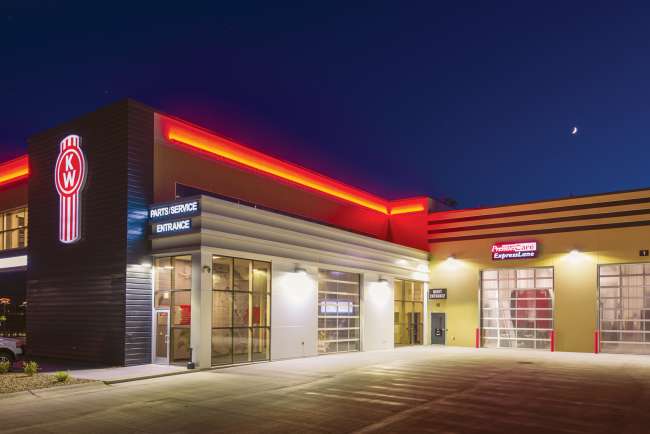Paccar Reports Fourth-Quarter, Full-Year Revenue Records

Paccar Inc. reported record revenue in the fourth quarter, reflecting its performance in the heavy-duty truck market in Europe and aftermarket results.
For all of 2018, record was also set as the company delivered 189,100 vehicles worldwide and profits topped $2 billion.
Quarterly net income for the period ended Dec. 31 was $578.1 million, or $1.65 per diluted share. That compared with earnings of $415.8 million, or $1.18, in the fourth quarter of 2017, excluding a one-time benefit from changes to U.S. tax law. Last year’s net income, including the $173.4 million tax benefit, was $589.2 million, or $1.67.
Revenue was $6.28 billion, a 15% increase from $5.45 billion reported in the same quarter in 2017.

“The North American and European economies are projected to continue growing in 2019. Our customers are very profitable and benefiting from strong freight demand. Freight activity grew 6.6% in the U.S. in 2018, the highest growth in 20 years, said Ron Armstrong, CEO of Paccar, parent to truck makers Kenworth Truck Co. and Peterbilt Motors Co.
“Kenworth and Peterbilt’s 2019 build schedules are substantially full due to the robust orders. We expect 2019 to be another excellent year for Paccar,” Armstrong said.
Paccar also posted record quarterly worldwide deliveries of 50,400 trucks.
Its backlog in North America extends through the year and is out a normal two to three months in Europe.
Parts revenue in the quarter was a record $970.9 million.
For the full year, Paccar earned record net income of $2.20 billion, or $6.24 per diluted share, 31% higher than the $1.68 billion, or $4.75, earned the year before.
It achieved record revenue of $23.50 billion for the year, a 21% increase from $19.46 billion in 2017.
Kenworth and Peterbilt’s 2019 build schedules are substantially full due to the robust orders. We expect 2019 to be another excellent year for Paccar.
Paccar CEO Ron Armstrong
Meanwhile, capital investments of $437.1 million and research and development expenses of $306.1 million in 2018 went to new vehicles and technologies, enhanced manufacturing and parts distribution facilities and innovative aftermarket support programs.
“We are increasing our capital and research and development investments in 2019. Capital expenditures are projected to be $525 to $575 million and research and development expenses are estimated to be $320 to $350 million,” said George West, vice president of Paccar.
Paccar is investing for “long-term growth in new truck models, integrated powertrains including zero-emission electrification and hydrogen fuel cell technologies, enhanced aerodynamic truck designs, advanced driver assistance systems and truck connectivity and expanded manufacturing and parts distribution facilities,” he said.
Class 8 industry retail sales in the United States and Canada were 285,000 units in 2018, 30% higher than the 218,000 vehicles sold in 2017. Industry retail sales in the United States and Canada are expected to increase to a range of 285,000 to 315,000 trucks in 2019, according to the Bellevue, Wash.-based company.
Paccar saw its stock price jump 6% to $64.84 as it beat the consensus on earnings per share, the results from its financial services business and its positive outlook on retail truck sales in North America, one analyst wrote in a note after Paccar’s earnings call.
“Strength was noted as broad-based across large and smaller fleets as well as linehaul versus vocational. Further, [Paccar] does not seem to be experiencing order cancellations in North America compared to what most industry forecasts have reported,” wrote Jamie Cook, an analyst with Credit Suisse.
The company’s financial services has a portfolio of 198,000 trucks and trailers, with total assets of $14.40 billion. PacLease, a major full-service truck leasing company in North America and Europe with a fleet of over 39,000 vehicles, is included in this segment.
The unit achieved fourth-quarter pretax income of $87.2 million, a 21% increase compared with the $71.9 million earned in the same quarter the year before. Revenue rose to $347.0 million compared with $332.2 million in the 2017 quarter.
For the full year, the financial service unit earned $305.9 million of pretax profit, 17% higher than the $261.7 million earned in 2017. Its revenue was $1.36 billion in all of 2018, 7% higher than the $1.27 billion achieved in 2017.





